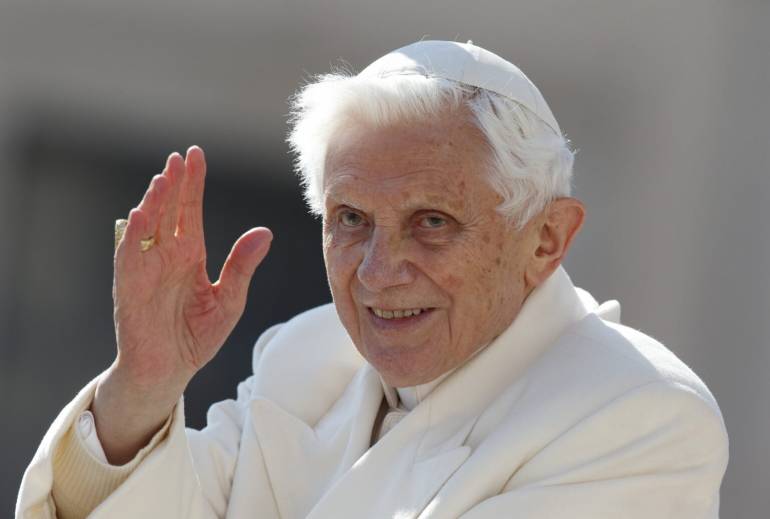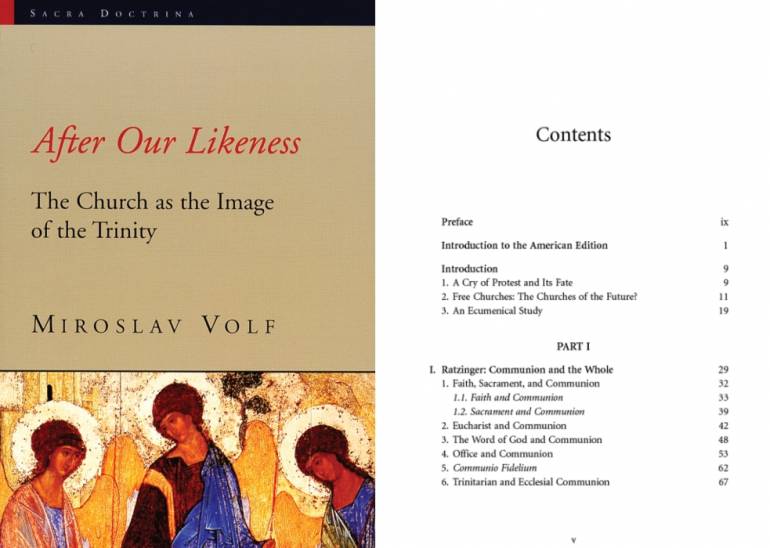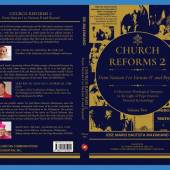How I became a silent admirer of Pope Benedict!

I began to hear the name of Joseph Ratzinger since the early eighties when I started to study philosophy and theology at Driyarkara School of Philosophy in Jakarta, as a young Franciscan.
I remember that, at the time, Ratzinger was appointed as the head of the Congregation for the Doctrine of Faith (CDF). Related to that appointment, I imagined two things of this figure. First, I thought that the person is smart and intelligent with a broad and deep theological knowledge and hence he was appointed the head of CDF. Second, I also felt that the person was very rationalistic, facing everything with a highly rationalistic way.
At that time, I was allergic to a person with an extremely rationalistic attitude because such a psychological tendency was not in tune with my personal way. I do not give a dominant role to my rational side because I involve my feelings (or rasa in Indonesian). I tend to suspect that rationalistic traits can easily become snobbish. Unconsciously there appeared in my heart an antipathy toward him. It became stronger since 1984, when CDF, published Instruction, which was “…accompanied by repressive measures against Father Leonardo Boff...” (Baum, 1987:104).
Boff was still a member of Franciscan Order in Brazil. As a young Franciscan, we considered Boff as our mentor in theology. He has a great name among us. The Instruction was aimed to “…warn Catholics of the dangers implicit in liberation theology” (Baum 1987:104). Boff was reminded of some strain of his liberation theology being accused of using the analytical tools of Marxists.
Reading the news about Boff, I imagined a Ratzinger with a strong face, even full of anger, rationalistic while at the same time spreading indirectly harsh words on this liberation theologian, especially his book, Church, Between Charism and Power (1979).
The stream of antipathy continued to live in my heart until mid-nineties. At that time, I graduated from my philosophical and theological formation and worked as a lecturer in theology in Bandung philosophical and theological School. One consequences of this antipathy was that I never searched for Ratzinger’s books or writings in library or theological journals. If by accident I found his books I would avoid them. I was not interested in them.
Such an intellectual antipathy lasted until the year 2000 when I pursued my theological studies in the faculty of theology in Katholieke Universiteit Nijmegen, Netherlands.
I remember that my professor in systematic-dogmatic theology gave us a project of lectures in ecclesiology using the book of Miroslav Volf, After Our Likeness (William B. Eerdmans: 1998). In this book Volf attempts to compare Ratzinger’s ecclesiology on the one hand, and that of John Zizioulas’, on the other. What a nice and interesting comparison!
It is this book that brought to me a paradigm shift, in “reading” Ratzinger as a theologian and as a church-man, and high official in curia-Romana. Volf’s book introduced to me a different face of Ratzinger as a theologian and faithful.
One of the strong points of comparison in that book was that in Ratzinger’s theological point of view the basic character of the church is Eucharistic and not so much Pentecostal because according to him the foundation of the church is the outpouring of the water and blood from the side of Jesus pierced by the lance of a roman soldier celebrated and memorized in Eucharistic celebration. So his ecclesiology is the ecclesiology of the sacred heart of Christ, Eucharistic Ecclesiology (Volf 1998:42-43).
Since reading that, I totally changed my mind and began to see a devotional aspect of his life. Then I read his books and realized that this person was a devote man, living as a faithful with his heart than with his head or rationalistic power and tendency. Ratzinger’s doctoral dissertation was on the theology of history of Bonaventure, the great intellectual and saint in Franciscan tradition.
From that time, I began to admire him and finally fell in love with him both as an intellectual and as faithful with a devotional tendency. I owe much to Volf’s book which introduced to me a totally different side of this cardinal.

I must acknowledge that the theological paradigm shift that I experienced in Nijmegen prepared me to accept as a faithful the fact that three years after I finished my theological formation in Nijmegen in 2002, Ratzinger was elected successor of John Paul II who passed away in the early April 2005.
When the name of Ratzinger was heard in the cry of habemus papam, I was so pleased and felt that this election was very opportune because this was the right man to lead the church: he had both capacity as a rational-intellectual person and as a deep-down devotional person, combined in such a unique way in his whole life.
Two years after his election as a Pope, he published a book, bearing his personal name, Joseph Ratzinger, rather than his pontifical name, Benedict XVI. The title of this book is important: Jesus of Nazareth (Bloomsbury: 2007). I read this book and I found once again the strong imprint of devotional tendency of his life mixed in a beautiful way with the insights of biblical Christology. He put this name, Jesus Christ, at the centre of Christian faith, as it is witnessed by a long church history and its missionary movements. Jesus Christ is the corner-stone of the Christian faith. There is no Christian faith without Jesus.
Here I remember two things.
First, I remember father Cletus Groenen OFM, who, at the early seventies of the last century, has put forwarded in his book on biblical Christology, that Jesus Christ is the centre of Christian faith. Without the confession of Christ’s name, there is no Christianity at all.
Second, I also remember the theologian, Paul Knitter (a former SVD missionary-priest). In 1985, Knitter published a book with a controversial title: No Other Name? (Orbis Books, 1985). Throughout the Church’s missionary history, the phrase, quoted from the Acts of the Apostles (4:12), was always written with a full stop: No Other Name. Throughout Church’s history of missionary movement, the phrase was written with an “exclamation mark” (!). But since Knitter’s book, at least in my reading, people started to think about the possibility of the existence of other names besides Jesus’ name. Though I know that finally Knitter made a come-back movement after this controversial book, but the controversy is already there on the theological scene.
But since Ratzinger’s book, I feel that the position of Jesus Christ is back on its proper place as the redeemer and saviour, the centre of Christian faith and life. This is one of the important points that I can find among other things from reading this book of Ratzinger.
At the end of his life, it is said that he uttered his final words by saying “Jesus Ich Liebe dich,” (Jesus, I love you). When I read the news about this cry, I imagined that there was a dialogue between Jesus and Pope Benedict XVI.
The dialogue, mirroring the dialogue between Peter and Jesus after the resurrection appearance story goes: Benedict, do you love Me? (mirroring the question to Peter, do you love me?). In Peter’s case the question was repeated three times and the dialogue was mounted in the dramatic cry of Peter realizing that he has betrayed Jesus three times (John 21:15-19).
In Pope Benedict’s case the dialogue was slightly modified: “Benedict, I know that during your life you have theologized about Me using your rational capacity and with your whole heart. Thanks so much for that endeavour. But before you come to me, I will ask you once again, do you love me? And in a loud voice, the holy father answered with his whole heart: Ich liebe dich Jesus. Then Jesus embraced him. At that moment, the pilgrimage of his life in this world stopped in a moment of silence, dreamed so much wholeheartedly by Augustine and Bonaventure (the theologians that have been admired and loved by Josef Cardinal Ratzinger, Benedict XVI).
RIP Holy Father, finally I admire and love you so much, in Jesus Christ.
Radio Veritas Asia (RVA), a media platform of the Catholic Church, aims to share Christ. RVA started in 1969 as a continental Catholic radio station to serve Asian countries in their respective local language, thus earning the tag “the Voice of Asian Christianity.” Responding to the emerging context, RVA embraced media platforms to connect with the global Asian audience via its 21 language websites and various social media platforms.














